This article was co-authored by Peter D'Aquino, L.Ac, MS, NCCAOM. Peter D'Aquino is an Acupuncturist and Diplomate in Oriental Medicine based in New York City. Peter is licensed to practice in New York State and holds board certification by the National Certification Commission for Acupuncture (NCCAOM) and Oriental Medicine in acupuncture and Chinese herbal medicine. He has 10 years of experience practicing holistic pain management and sports medicine. He specializes in treating pain and orthopedic conditions along with rehab, fitness, weight loss, and digestive issues. He is also certified as a Personal Trainer by The National Academy of Sports Medicine (NASM) and certified in Functional Range Conditioning (FRC) and Functional Range Release (FRR) movement therapy. He holds an MA in Acupuncture and Herbal Medicine from Pacific College of Oriental Medicine in New York (PCOM).
There are 9 references cited in this article, which can be found at the bottom of the page.
This article has been viewed 198,050 times.
Acupuncturists, and other practitioners of Acupuncture and Oriental Medicine (AOM), use traditional Chinese medical practices to treat pain. They insert thin needles along the body's meridians, or energy vessels, to relieve tension, release energy, and stimulate the body. Acupuncturists may help treat patients suffering from arthritis, headaches, asthma, lethargy, stress, carpal tunnel syndrome, menstrual discomfort, or addiction. According the American Academy of Medical Acupuncture, requirements for acupuncturist licensure vary by state, so you must look up the regulations where you live to become certified as an acupuncturist.[1]
Steps
Learning About Acupuncture
-
1Make sure you have the skills to be an acupuncturist. Not everyone can be an acupuncturist, as it requires several specific skills. You will need good hand-eye coordination, steady hands, strong communications skills, and a passion for working with people.
-
2Choose your school of acupuncture. As a traditional practice, there are a variety of different schools of thought regarding best practices, such as traditional Chinese, Japanese, and Five Element.Advertisement
-
3Talk to practicing acupuncturists. Find out what they did to earn their certification, and why they went into the profession. They can also tell you about the difficulties you will encounter in trying to get started, as both a student and practitioner.
-
4Get a command of the language spoken in your country. If you want to work in the United States, then you'll have to demonstrate a command of the English language to work as an acupuncturist. You will have to know how to understand and communicate flawlessly with your patients and review clinical records.
- When it comes to acupuncture, it is crucial to know exactly what to say to your patients and to understand when your patients are expressing discomfort or concern.
- Depending on the school of acupuncture you follow, you may also need to learn the traditional language of that school. At the very least, you'll need to learn the Chinese medical terms that are used in acupuncture.[2]
Getting Your License
-
1Research the acupuncture licensing requirements in the state where you will work. Certification requirements vary widely by state. Some states require you to earn a doctor of medicine degree, while others only necessitate hourly coursework with supervised training. These requirements will dictate the path you need to take to be an acupuncturist in your state.
- Each state will also have rules regarding the "scope of practice," that is, what you are allowed to do once licensed in that state.
- Individual states have different rules regarding certification reciprocity. If you want to practice acupuncture in two or more states, check with the individual states to determine what their rules are regarding the recognition of other state certifications.
- If you're already a physician and would like to practice acupuncture, check out the American Board of Medical Acupuncture, which offers examinations and explains the standards for physicians who want to practice acupuncture.[3]
-
2Meet the educational requirements for a training program. Most acupuncture training programs require students to have a bachelor's degree. Your degree can be in any subject, but you may want to take classes in fields such as physiology, anatomy, biology, and psychology. A bachelor's degree in a healthcare or alternative medicine related subject can also be helpful for a career as an acupuncturist.
- While a bachelor's degree is ideal, some acupuncture schools only require two academic years of education at the baccalaureate level, or the equivalent, such as certification for a medical profession such as nursing.
- The requirements vary by program and state, so look at the requirements for your state and program.
-
3Attend an accredited acupuncture college. Each college will have a different emphasis, but all will involve the study and practice of acupuncture, along with other aspects of Chinese herbal medicine. Most acupuncture programs take about 3 years to finish, and up to 4 years for a program in oriental medicine.
- Schools are certified by the Accreditation Commission for Acupuncture and Oriental Medicine (ACAOM), which can help you find programs in your state.[4]
-
4Apply for certification. The National Certification Commission for Acupuncture and Oriental Medicine (NCCAOM) provides the general certification for the profession. You will need to fill out an application, available on their website, and pay a certification fee. Though this is a private organization, NCCAOM certification can pass for licensing in many states.[5]
- The application fee for Acupuncture Certification is currently $475. Different certifications granted by the NCCAOM have different fees, so be sure to check if you intend to get a different certification.[6]
- The application also requires official transcripts from your AOM program, so be sure to contact your school and tell them to send those in.
- It is best to begin filling out the certification paperwork in the final year of your studies. It is best to check with your school for the best time to get that paperwork in. You don't want to delay certification, as the process takes some time, and it will be very hard (if not impossible) to get a job without it.[7]
-
5Pass the NCCAOM exam. Once your application has been processed and approved by the organization and state board, you will be allowed to sign up to take the certification exam. This exam is required for licensure in most states. Once you pass this exam, you are board certified. In most states, you will be recognized as a licensed acupuncturist (L.Ac.). Some states will use the designation "Acupuncture Physician" or "Doctor of Oriental Medicine."
- The NCCAOM's website provides study guides to help prepare for the exam.[8]
- You cannot take the exam without first having your application approved by the NCCAOM.
- Some states will require additional exams for more certification. Check the list provided by the NCCAOM for the requirements in your state.
Succeeding in Your Career
-
1Get a job as an acupuncturist. Most beginner acupuncturists start out working with an established practice to gain experience and build up a client base. Acupuncturist jobs are typically easier to find in larger metropolitan areas than in small towns. You may have to start with an apprenticeship or an internship to gain more experience to make yourself a desirable candidate for an independent practice.
-
2Develop meaningful relationships with your clients. It's not easy to make a living as an acupuncturist, and if you want to survive in the business, then you have to remember that your clients are everything to you. You need to be polite, learn a little bit about them and remember the things they've told you on previous visits, to be friendly and approachable, and to make sure they feel comfortable coming to your office time after time.
- After each visit, make sure your clients book a follow-up appointment right away. This will encourage them to keep coming.
- Call up your clients the day before their appointments. This will greatly reduce the rate of no-shows and will show them you care.
- You can also get referrals from your clients. Ask them if they have any friends who would be interested in your practice. This is a great way to get even more clients.
-
3Continue your education. If you want to succeed, you can't just stop with your license to be an acupuncturist. You should take night classes at a community college or pursue another master's degree in a relevant field such as Acupuncture Practice Management, Marketing, or Business Success Principles. Many practitioners get into trouble when they focus only on healing principles and techniques and don't think about the business end of things. If you really want to help your clients, then you have to gain skills to help you keep your business afloat.
- Attending any continuing education courses can give you valuable experience, even if they aren't business-related. Just as in any field of medicine, acupuncture treatments are constantly evolving. Pursue continuing training to learn new strategies, improve your techniques and keep your skills current.
-
4Maintain your certification. Your certification from NCCAOM will need renewal every four years. You will need to fill out a form, and document your participation in Professional Development Activities (PDA). You will need a minimum of 60 points worth of PDA to qualify for recertification. You should mail your application materials to the NCCAOM at least 60 days before your certification is due to lapse. To prepare for recertification, read the handbook posted on the Council's website.[9]
- If you miss these deadlines, your status will be considered "Lapsed" or "Inactive," and require additional work to regain certification.
-
5Consider starting your own business. Once you've gained some experience, understood the business side of things, and have developed a client base, you should consider starting your own acupuncture business. With your knowledge, you can become a business owner and have your clients follow you to your new practice. The more connections you have in the field, the better.
- If you know a few acupuncturists who would want to move to your business with you, you already have a leg up.
Expert Q&A
-
QuestionHow do I get certified in acupuncture?
 Peter D'Aquino, L.Ac, MS, NCCAOMPeter D'Aquino is an Acupuncturist and Diplomate in Oriental Medicine based in New York City. Peter is licensed to practice in New York State and holds board certification by the National Certification Commission for Acupuncture (NCCAOM) and Oriental Medicine in acupuncture and Chinese herbal medicine. He has 10 years of experience practicing holistic pain management and sports medicine. He specializes in treating pain and orthopedic conditions along with rehab, fitness, weight loss, and digestive issues. He is also certified as a Personal Trainer by The National Academy of Sports Medicine (NASM) and certified in Functional Range Conditioning (FRC) and Functional Range Release (FRR) movement therapy. He holds an MA in Acupuncture and Herbal Medicine from Pacific College of Oriental Medicine in New York (PCOM).
Peter D'Aquino, L.Ac, MS, NCCAOMPeter D'Aquino is an Acupuncturist and Diplomate in Oriental Medicine based in New York City. Peter is licensed to practice in New York State and holds board certification by the National Certification Commission for Acupuncture (NCCAOM) and Oriental Medicine in acupuncture and Chinese herbal medicine. He has 10 years of experience practicing holistic pain management and sports medicine. He specializes in treating pain and orthopedic conditions along with rehab, fitness, weight loss, and digestive issues. He is also certified as a Personal Trainer by The National Academy of Sports Medicine (NASM) and certified in Functional Range Conditioning (FRC) and Functional Range Release (FRR) movement therapy. He holds an MA in Acupuncture and Herbal Medicine from Pacific College of Oriental Medicine in New York (PCOM).
Licensed Acupuncturist Research different programs to see which one suits your preferences best. For instance, you might prefer to work in a more traditional practice, or you might be more interest in a modern branch of acupuncture, such as motor point acupuncture, which uses electric stimulation.
Research different programs to see which one suits your preferences best. For instance, you might prefer to work in a more traditional practice, or you might be more interest in a modern branch of acupuncture, such as motor point acupuncture, which uses electric stimulation. -
QuestionWhat are some lessons someone should know before they become an acupuncturist?
 Peter D'Aquino, L.Ac, MS, NCCAOMPeter D'Aquino is an Acupuncturist and Diplomate in Oriental Medicine based in New York City. Peter is licensed to practice in New York State and holds board certification by the National Certification Commission for Acupuncture (NCCAOM) and Oriental Medicine in acupuncture and Chinese herbal medicine. He has 10 years of experience practicing holistic pain management and sports medicine. He specializes in treating pain and orthopedic conditions along with rehab, fitness, weight loss, and digestive issues. He is also certified as a Personal Trainer by The National Academy of Sports Medicine (NASM) and certified in Functional Range Conditioning (FRC) and Functional Range Release (FRR) movement therapy. He holds an MA in Acupuncture and Herbal Medicine from Pacific College of Oriental Medicine in New York (PCOM).
Peter D'Aquino, L.Ac, MS, NCCAOMPeter D'Aquino is an Acupuncturist and Diplomate in Oriental Medicine based in New York City. Peter is licensed to practice in New York State and holds board certification by the National Certification Commission for Acupuncture (NCCAOM) and Oriental Medicine in acupuncture and Chinese herbal medicine. He has 10 years of experience practicing holistic pain management and sports medicine. He specializes in treating pain and orthopedic conditions along with rehab, fitness, weight loss, and digestive issues. He is also certified as a Personal Trainer by The National Academy of Sports Medicine (NASM) and certified in Functional Range Conditioning (FRC) and Functional Range Release (FRR) movement therapy. He holds an MA in Acupuncture and Herbal Medicine from Pacific College of Oriental Medicine in New York (PCOM).
Licensed Acupuncturist Learning acupuncture can be fairly technical, because you really have to wrap your head around a way of medicine that's very different than Western medicine. You can go to school—many acupuncture schools today are integrative, meaning they teach a combination of Western medicine and traditional Chinese medicine. Most programs take about 4 years to complete.
Learning acupuncture can be fairly technical, because you really have to wrap your head around a way of medicine that's very different than Western medicine. You can go to school—many acupuncture schools today are integrative, meaning they teach a combination of Western medicine and traditional Chinese medicine. Most programs take about 4 years to complete.
References
- ↑ https://www.ncbi.nlm.nih.gov/pmc/articles/PMC5512332/
- ↑ Peter D'Aquino, L.Ac, MS, NCCAOM. Licensed Acupuncturist. Expert Interview. 14 April 2020.
- ↑ http://www.dabma.org
- ↑ http://acaom.org/directory/
- ↑ http://www.nccaom.org/applicants
- ↑ http://www.nccaom.org/applicant-fees/
- ↑ http://www.nccaom.org/frequently-asked-questions/
- ↑ http://www.nccaom.org/applicants/exam-content
- ↑ http://www.nccaom.org/diplomates/recertification
About This Article
To become an acupuncturist, you'll need to have good hand-eye coordination, steady hands, and a passion for working with people. Also, most acupuncture training programs require students to have a bachelor's degree, so make sure you do well in school and make plans to get your degree if you don't already have one. Once you have a degree, you can look into attending an accredited acupuncture college and eventually apply for your certification. For tips on how to find a job as an acupuncturist, scroll down!
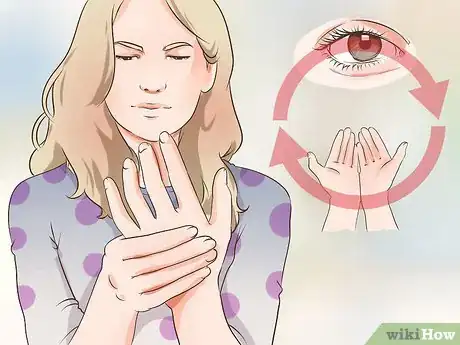





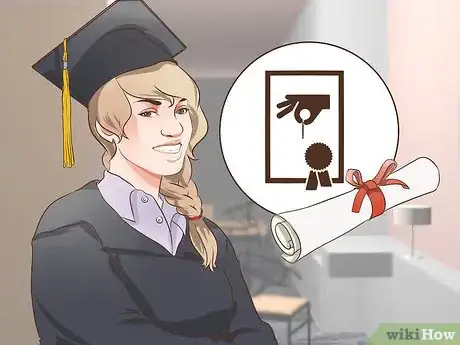

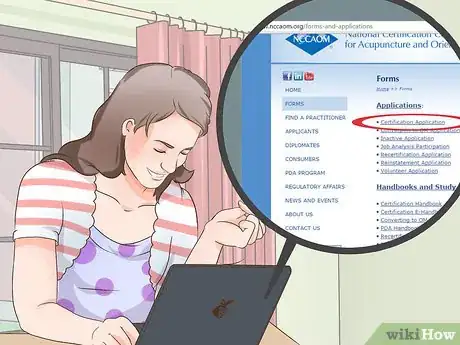

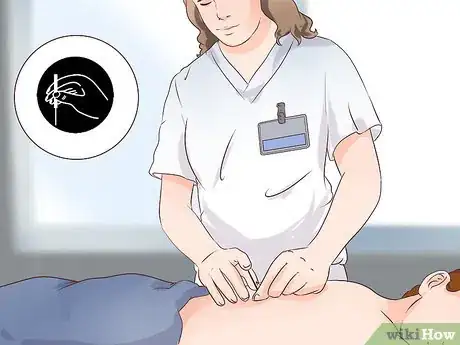


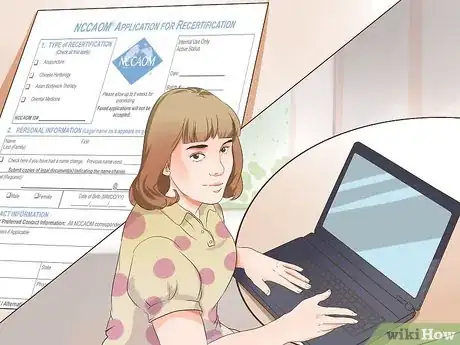

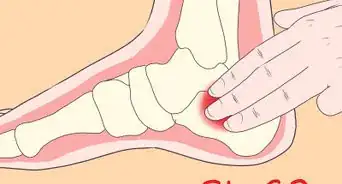


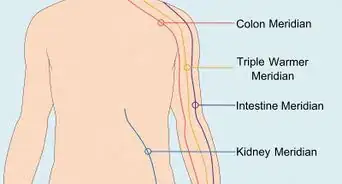












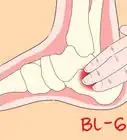






































Medical Disclaimer
The content of this article is not intended to be a substitute for professional medical advice, examination, diagnosis, or treatment. You should always contact your doctor or other qualified healthcare professional before starting, changing, or stopping any kind of health treatment.
Read More...